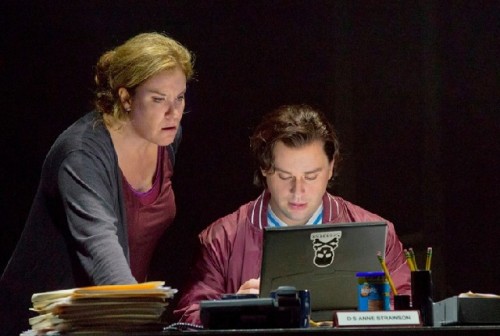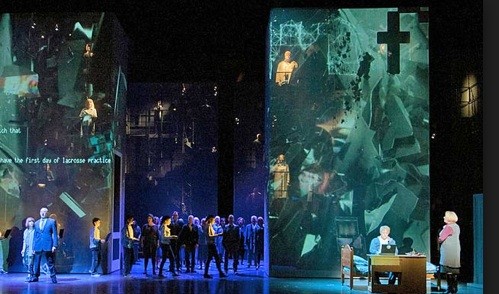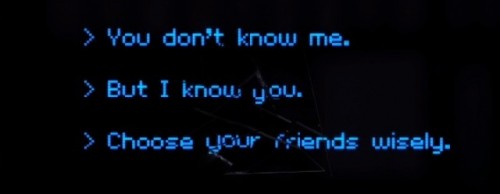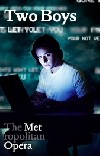Nico Muhly's Opera Two Boys at the Met
From Awakening Desire to Identity, A Treacherous Course
By: Susan Hall - Nov 14, 2013
Two Boys
by Nico Muhly
Libretto by Craig Lucas
Metropolitan Opera
New York, New York
Fall, 2013
Attending the Saturday matinee performance of Two Boys, one question is quickly answered. Octogenarians and teens alike loved this opera. In the ladies room, the regulars for matinees, who no longer go out in the evening, were rhapsodic about the music and the performances. Young people were fascinated by something familiar and hip happening in an oversized, old-fashioned venue.
Much comment has been made on the dated-ness of internet communication in Two Boys. But pause for a moment. This method of getting together probably occurred in men’s rooms up until the chat room. In the US our Senators have continued to lock themselves in stalls, perhaps because they think those actions are not traceable to the toilet. The NSA, funded by the votes of the same Senators, has taught us otherwise.
Set designer Michael Yeargen captures the feeling of the internet, even as it looks today. Banks currently have chat rooms just like those projected on stage. We know that the web can ensnare us. But young people, who throughout history have felt impervious to the inevitable, still think they can avoid detection.
So we have a detective in Two Boys, trying to figure out a murder, which appears to have been prompted by internet communication between two boys.
Nico Muhly is not only a brilliant composer, but also an innovative and deep person. He and I shared an appreciation of Iestyn Davies' voice before Davies caught on. One evening we discussed the origins of Dark Sisters. I saw Emma Donaghue’s Room in it. When I mentioned this Booker prize work, Muhly started. Yes, he had read and been influenced by it. He knows no bounds.
Yet Muhly likes to commence with the real and Two Boys is no exception. The true story occurred in England at the turn of this century. The reality of the libretto both clashes and tangles with Muhly’s music. The arpeggiated chords, harp, bell-like sounds and the melodic lines that make his music approachable. It both underlines and contrasts with the story. There is no question that the music’s texture conjures up adolescent confusion and yearning.
Muhly’s background in the chorales of New England churches cropped up in “Abide with Me, Fast falls the eventide” in Dark Sisters. In Two Boys, the internet itself is a chorale, “r u there?” “r u there?” replacing ‘Sanctus.’ A religious sense pervades Muhly’s music. But instead of using the ritualistic repetitions of his mentor, Philip Glass, he goes to the source, sometimes offering it up whole and at others referencing it. David Robertson conducted with aplomb.
I was surprised to see some critics declare that this was not an opera, or that its subject was dated. An opera, by anyone’s definition, is a story meshed with music. In an interesting panel led by the much-maligned George Steel, the distinction was made with a musical, in which people step out to sing. Opera is integrated, unless the soprano does not have ‘her’ aria and suddenly blurts out “Vissi d’arte.’
What the music and the story of the opera Two Boys conveys is the feeling of sexual awakening in puberty. Only a first-rate article in Salon.com by J. Bryan Lowder talks about “desire before identity.”
Developed as a police procedural, the older generation detective learns about internet communication as she tries to unravel a murder. The music and story portray the passionate and poorly understood emotional life of preteens and teens. In some ways not discussing the opera’s homoerotic content is apt. This could be the story of a boy and a girl.
But it isn’t. And chat rooms are probably more dangerous for young gays than for straights. Danger is evident in every click of the computer keyboard and every note sung. Infinite disguises are available.
Alice Coote is a superb detective, singing as usual beautifully, with a comfortable fit into the narrative line. Paul Appleby’s break through performance as Brian realizes all the promise of his earlier smaller roles. A sixth grader from Summit, New Jersey sang the real Jake with a purity and loveliness that made me yearn for the castrati sans gruesome operation. It was easy to see why Italian aristocrats feinted and fawned over these spectacular voices.
But to Muhly. The story is a great one for opera. I don’t know why Muhly was encouraged to add a scene with the detective and her mother, in which it is revealed that the detective had an illegitimate son who was given up at birth. The son might have been around the same age as the two boys. But the detail is unnecessary to the development of the story and in fact interferes with the atmosphere Muhly has so carefully crafted in his music. Go figure.
Attendance according to the Met website has been excellent. A good reason to support this young composer whose mastery of his craft is already clear. Two Boys is an opera, and a wonderful one at that.





